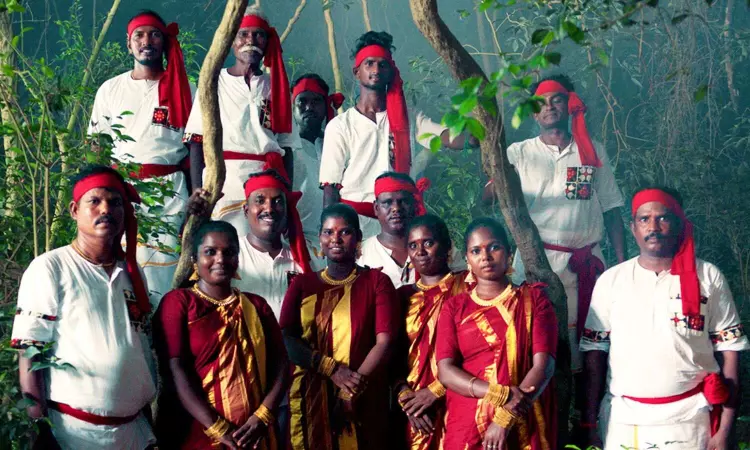Oh Hoi! Beats of Irula tribes echo cultural diversity
With over five million views on YouTube, Oh Hoi features the Irula tribal music band Mullai Kalai Kuzhu. This season of Coke Studio Tamil aims to preserve the rich musical heritage by blending tradition with modernity

Mullai Kalai Kuzhu band
CHENNAI: The presence of the Irula tribes gained significant recognition across the state following the release of the film Jai Bhim, which highlighted their struggles and hardships. Sean Roldan, who composed the music for the film, envisioned Oh Hoi for Coke Studio Tamil Season 2, featuring the traditional music of the Irulas.
“Through the film, I had the opportunity to interact with the tribe and delve deep into their culture, life and everything. That understanding helped me to curate the Oh Hoi song, exploring the intriguing relationship between urban and natural landscapes,” Sean starts the conversation.
Still of Benny Dayal from the song
The song features vocals by Benny Dayal and Mullai Kalai Kuzhu. Lyrics are penned by Arivu. “I wanted to create a tribal song, blending modernity with a contemporary artiste like Benny. The idea was to bring different styles together. Though ancient, the beats of Irula music are modern and can make one groove to the rhythms,” adds the curator.
Oh Hoi serves as a poignant narrative, highlighting the crucial balance between progress and preservation. “Bridging two different genres is a challenging process, but it is also incredibly rewarding. An open mind and a receptive heart lead us to achieve the seemingly unachievable,” says Benny Dayal.
Having inherited the musical skills from his father and grandfather, Kanniyappan from Mullai Kalai Kuzhu is on cloud nine seeing the overwhelming response for Oh Hoi. “I wanted to tweak the concept and started incorporating tribal life and struggles we face in our songs, as music is a tool to communicate our needs to the government and society,” Kanniyappan shares. He started Mullai Kalai Kuzhu in 2018, with 15 band members, who are mostly first-generation graduates. Among the 15 members, six are women.
Sean Roldan
Sean Roldan explains that the traditions of the Irula tribe inspired him to include them in the project. “The tribe continues to uphold the lifestyle of their ancestors. However, this doesn’t mean they are stuck in the past. Their music has been remarkably preserved, and we felt that highlighting it in this song would make an important statement to raise awareness about the tribe. Similarly, there are many other tribes spread across the state,” he adds.
Some of the traditional instruments used by Irulas are adavu, palavai, kondangattai and salangai, among others. “Telling our stories through music will help us reach people from various walks of life. We start our performance by thanking our god, Kanniyamman, and then delve deep into the history, tradition, culture and our present struggles to get our basic rights,” says Kanniyappan, who is also a social worker.
“Opportunities like these, provide us with a platform to showcase our talent and make our presence known. We aim to preserve our traditional music and pass it on to the next generation,” he aims. He worked as a teacher for some time but left the job to serve society and uplift various minority communities. Kanniyappa believes that only through media can conversations about different tribal groups be initiated and impactful changes be made.
Kanniyappan
Reflecting on how stages like these can expand the music scene and provide a platform for budding traditional artists, Sean Roldan remarks, “We need a platform for representation. As a musician, my focus is on bringing various artistes together, rather than creating separate spaces for each. The best music emerges when a mix of different musicians collaborates. This can only happen when communication is orchestrated engagingly. That’s where curation plays a crucial role. This is why I enjoy curating projects like the Coke Studio series, as it allows me to bring many artistes onto the same platform.”



